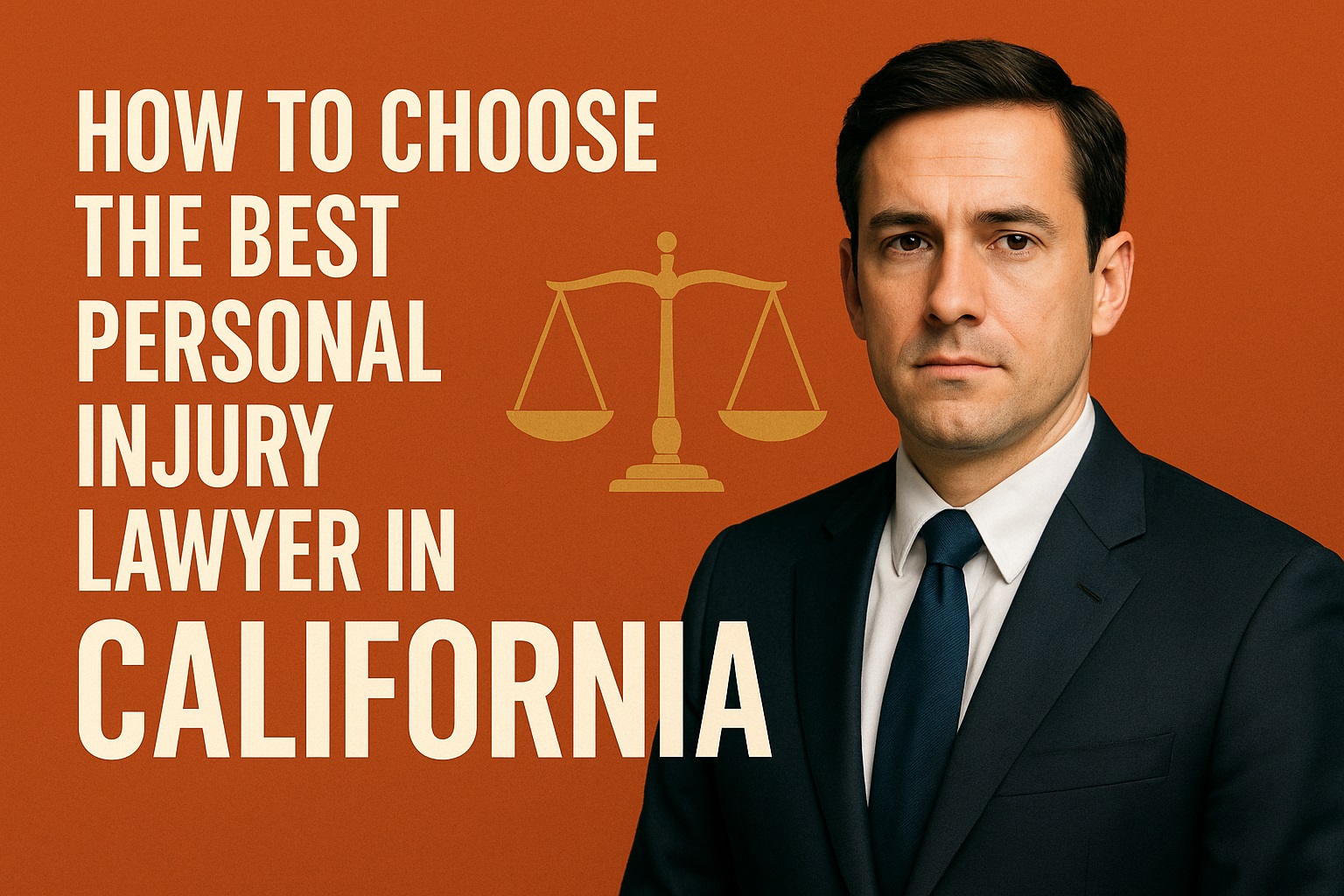Suffering an injury due to someone else’s negligence can be devastating—emotionally, physically, and financially. In California alone, over 700,000 personal injury claims are filed each year, with average awards exceeding $50,000¹. Whether you’ve been hurt in a car accident, a slip-and-fall, or by a defective product, hiring the best personal injury lawyer in California can make the difference between a fair settlement and being left with crippling medical bills. This guide will walk you step by step through choosing the right attorney for your case, ensuring you maximize compensation and regain peace of mind.
1. Understand the Role of a Personal Injury Lawyer
A personal injury lawyer represents clients who have been physically or psychologically injured through no fault of their own. Their duties include:
- Case Evaluation: Determining whether you have a viable claim
- Investigation: Gathering evidence (police reports, medical records, witness statements)
- Negotiation: Dealing with insurance companies to secure fair compensation
- Litigation: Taking your case to trial if a settlement isn’t reached
Having a skilled attorney ensures deadlines (statutes of limitation) are met—California’s general statute is two years from the date of injury²—and that your rights are vigorously defended.
2. Look for Specialized Experience in California Personal Injury Law
Not all lawyers handle personal injury cases. Within the field, look for these specialties:
- Car & Truck Accidents: Familiarity with California Vehicle Code and reconstruction experts
- Premises Liability: Knowledge of premises-liability standards under California Civil Code § 1714³
- Product Liability: Understanding of strict-liability principles for defective products
- Medical Malpractice: Adherence to MICRA (Medical Injury Compensation Reform Act) limits
Tip: Check whether the lawyer is a member of the California Applicants’ Attorneys Association (CAAA) or the Consumer Attorneys of California (CAOC)—organizations dedicated to protecting injury victims’ rights.
3. Assess Track Record and Reputation
A lawyer’s past results can indicate their ability to handle your claim:
- Settlement & Verdict Amounts: Has the attorney secured multi-million-dollar outcomes for clients?
- Case Studies: Look for published summaries on the firm’s website or in legal news.
- Peer Reviews: Ratings from Martindale-Hubbell (AV Preeminent®) or Avvo (Superb 10.0) demonstrate peer and client respect.
- State Bar Standing: Verify there are no disciplinary actions via the California State Bar website⁴.
4. Evaluate Communication Style and Accessibility
Personal injury cases often take 12–24 months from filing to resolution⁵. During that time you need:
- Responsive Communication: Ask about expected response times—email within 24 hours?
- Dedicated Team: Will you work directly with the lead attorney or a paralegal?
- Regular Updates: Confirm how often you’ll receive status reports (monthly, quarterly).
A clear, compassionate communicative approach reduces stress during a difficult period.
5. Understand Fee Structures and Costs
Most personal injury lawyers in California work on a contingency fee basis:
- Typical Rate: 33⅓% if the case settles before suit is filed; possibly 40% if it goes to trial⁶.
- Costs & Expenses: Clarify whether things like expert-witness fees, court filing fees, and medical record retrieval are deducted before or after your attorney’s fee.
Warning: Beware of “too good to be true” low contingency rates; they may indicate lack of experience or hidden expenses.
6. Look for Personalized Attention vs. Mill-Style Firms
Large firms advertise heavily, but may delegate your case to junior associates. Smaller boutique firms may offer:
- Direct Attorney Access: You speak with your lead lawyer on each development.
- Tailored Strategy: A bespoke legal plan rather than “one-size-fits-all.”
- Greater Accountability: More invested in client satisfaction and word-of-mouth referrals.
Balance your need for name-brand reputation versus individualized care.
7. Check Client Testimonials and Online Reviews
Websites like Google Reviews, Yelp, and Avvo showcase client satisfaction:
- Look for Patterns: Multiple mentions of timely communication, compassion, and successful outcomes.
- Red Flags: Repeated complaints of unreturned calls, unexpected bills, or lack of results.
Keep in mind negative reviews can stem from disappointed expectations, not necessarily malpractice.
8. Meet Potential Lawyers for Free Consultations
Most personal injury attorneys in California offer no-cost, no-obligation consultations. Prepare for meetings by:
- Bringing Documentation: Accident reports, medical bills, and any correspondence from insurers.
- Listing Questions: Ask about their experience with your specific injury type, average case value, and strategy.
- Assessing Comfort Level: Note whether they listen actively, explain complex terms clearly, and show genuine concern.
After consultations, compare notes: who gave concrete next steps? Who felt like a partner?
9. Verify Resources and Trial Readiness
Insurance companies often pressure attorneys to settle for lowball offers. You want a lawyer with:
- Financial Backing: Ability to front costs of experts, depositions, and trial exhibits.
- In-House Experts: Access to medical professionals, accident reconstruction specialists, or economists.
- Trial Experience: A proven record in jury trials—settlement isn’t always possible without trial leverage.
A willingness to litigate strengthens negotiation position dramatically.
10. Make Your Decision and Formalize the Agreement
Once you’ve selected the best personal injury lawyer in California for your needs:
- Review the Retainer Agreement Carefully: Ensure all fees, costs, and responsibilities are spelled out in writing.
- Clarify Communication Protocols: Who you call for updates, how billing statements will be sent.
- Sign and Begin Work: Your attorney will send a demand letter to the insurer, commencing formal negotiations.
Remember, you retain the right to discharge your lawyer at any time; California courts will enforce only “reasonable” fees on any amounts already recovered⁷.
Conclusion
Choosing the best personal injury lawyer in California is a critical step toward securing full, fair compensation after an accident. By focusing on specialized experience, proven results, transparent fee arrangements, and strong communication, you’ll find an advocate who fights for your rights as passionately as you do. Don’t wait—California’s two-year statute of limitations is strict, and the sooner your attorney starts building your case, the stronger your position will be.








